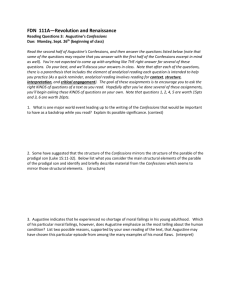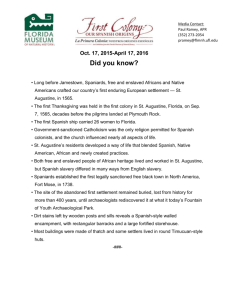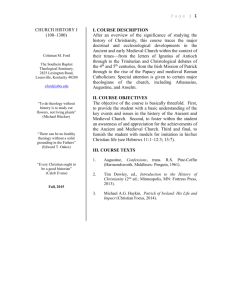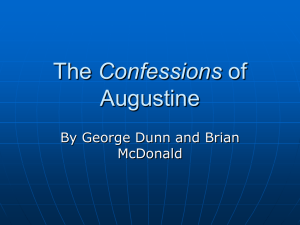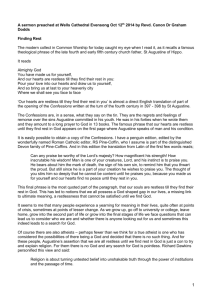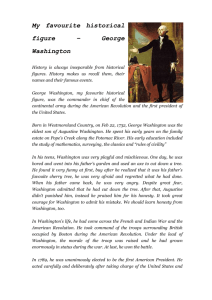Pears before Swine : Augustine, Confessions 2.4.91
advertisement
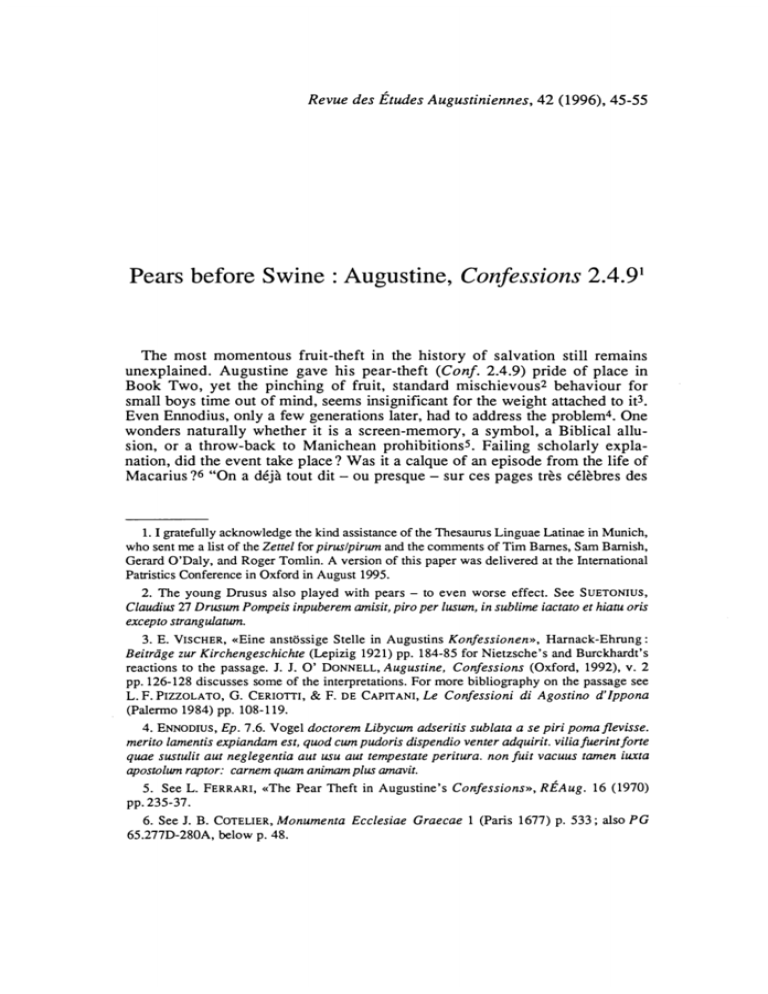
Revue des Études Augustiniennes, 42 (1996), 45-55
Pears before Swine : Augustine, Confessions 2.4.91
The most momentous fruit-theft in the history of salvation still remains
unexplained. Augustine gave his pear-theft (Conf. 2.4.9) pride of place in
Book Two, yet the pinching of fruit, standard mischievous 2 behaviour for
small boys time out of mind, seems insignificant for the weight attached to it3.
Even Ennodius, only a few generations later, had to address the problem4. One
wonders naturally whether it is a screen-memory, a symbol, a Biblical allusion, or a throw-back to Manichean prohibitions 5 . Failing scholarly explanation, did the event take place ? Was it a caique of an episode from the life of
Macarius ? 6 "On a déjà tout dit - ou presque - sur ces pages très célèbres des
1.1 gratefully acknowledge the kind assistance of the Thesaurus Linguae Latinae in Munich,
who sent me a list of the Zettel for pintsΊ'pirwn and the comments of Tim Barnes, Sam Barnish,
Gerard O'Daly, and Roger Tomlin. A version of this paper was delivered at the International
Patristics Conference in Oxford in August 1995.
2. The young Drusus also played with pears - to even worse effect. See SUETONIUS,
Claudius 27 Drusum Pompeis inpuberem amisit, piro per lusum, in sublime iactato et hiatu oris
excepto strangulatum.
3. E. VISCHER, «Eine anstössige Stelle in Augustins Konfessionen», Harnack-Ehrung :
Beiträge zur Kirchengeschichte (Lepizig 1921) pp. 184-85 for Nietzsche's and Burckhardt's
reactions to the passage. J. J. O' DONNELL, Augustine, Confessions (Oxford, 1992), v. 2
pp. 126-128 discusses some of the interpretations. For more bibliography on the passage see
L. F. PIZZOLATO, G. CERIOTTI, & F. DE CAPITANI, Le Confessioni di Agostino d'Ippona
(Palermo 1984) pp. 108-119.
4. ENNODIUS, Ep. 7.6. Vogel doctorem Libycum adseritis sublata a se piri pomaflevisse.
merito lamentis expiandam est, quod cum pudoris dispendio venter adquirit. villa fuerintforte
quae sustulit aut neglegentia aut usu aut tempestate peritura, non fuit vacuus tarnen iuxta
apostolum raptor: carnem quam animamplus amavit.
5. See L. FERRARI, «The Pear Theft in Augustine's Confessions», RÉAug. 16 (1970)
pp.235-37.
6. See J. Β. COTELIER, Monumenta Ecclesiae Graecae 1 (Paris 1677) p. 533; also Ρ G
65.277D-280A, below p. 48.
46
DANUTA
SHANZER
Confessions"1 Perhaps not. Why a theft? Why a tree? Why a pear? The first
two questions have been satisfactorily answered. Not, so far as I know, the
third, which I will address in this note, by adducing a possible new source for
the episode.
The Biblical background. Trees have long seemed a significant pattern in the
Confessions. Just as the tree of the Knowledge of Good and Evil in Genesis
was counterbalanced by the Cross8, which redeemed original sin, so too in the
Confessions the evil pear tree is parallelled by the fig tree in C. 8, under which
Augustine's conversion takes place 9 . This structuring device was designated
"arboreal polarisation" by L. Ferrari10. Augustine's pear is similar to the Tree
of the Knowledge of Good and Evil. Augustine uses the theft of its fruit to
represent sin, pure and simple, unmotivated even by need or greed. The boys
steal for the love of theft, i. e. for the sake of evil, we are told at first11.
That the pear tree episode is to some extent patterned on the Bible is clear,
when one examines the way Augustine introduces his story: arbor eratpirus in
vicinia nostrae vineae pomis onusta nee forma nee sapore inlecebrosis12. How
should this be rendered ? E. Tréhorel and G. Bouissou translate, "Il y avait, à
proximité de notre vigne, un poirier chargé de fruits que ni leur beauté ni leur
goût ne rendaient alléchants." Chadwick translates, "There was a pear-tree
near our vineyard laden with fruit though attractive in neither colour nor
taste"i3.
But the precise meaning is not that transparent, and the translation of the
sentence depends on how one construes the phrase arbor ... pirus. Tree names
appear in the following forms: 1. species alone (pirus)y 2. arbor+species in
genitive (arbor piri)14, 3. arbör+adjectival form of the species-name (arbor
7. So begins P. CAMBRONNE, «Le 'Vol des poires' (Augustin, Confessions 2.4.9-10.18)»,
RÉL1Ì (1993) p. 228.
8. RAC 2. 24-25 "Baum". For the Tree of Knowledge traditionally opposed to the Cross,
cf. AMBROSE, in Ps. 35:3 ; FIRM. MAT. de errore 25.2 arbor Ugni pestiferum deceptispabulum
praebuit: lignum crucis vitam immortali conpage restituii (ed. C. HALM, CS EL 2 p. 118.6
[Vienna 1867]); ORIGEN, contra Cels. 6.34.36.
9. C. 8.12.28 ego sub quadamfici arbore stravi me nescioquomodo et dimisi habenas
lacrimis etproruperant flumina oculorum meorum. Also V. BUCHHEIT, «Augustinus unter dem
Feigenbaum», Vig. Christ. 22 (1968) pp. 257-71 who interprets the fig as a symbol of sexual
sin.
10. L. FERRARI, «Pear Theft», (above n. 5) pp. 233-41 ; followed by «The Arboreal
Polarization in Augustine's Confessions», RÉAug. 25 (1979) 35-46 in which (p. 40) he also
detects a polarisation of the good and evil trees in Matthew 7:17-20.
11. C. 2.4.9 nee ea re volebam frui, quam furto appetebam, sed ipso furto et peccato.
C. 2.6.12 quid ego miser in te amavi, o furtum meum, of acinus illudmeum nocturnum ...
12. Conf 2.4.9.
13. H. CHADWICK, St. Augustine: Confessions (Oxford 1991).
14. See TLL sv. 'arbor' 426.38-45.
AUGUSTINE, CONFESSIONS 2.4.9
47
ficulnea)15, 4. arbor+ species in same case (arbor pirus)16. Species alone is
common in Classical Latin. The second type appears in the Bible. Courcelle
had already remarked that Augustine's use of/ici arbore in C. 8.12.28 must
echo John 1:48 and 50i 7 . But in the Vulgate examples of arbör+species-name
in the genitive or arbor plus species-name in the same case are far less
common than the simple name of the tree18.
Augustine's usage is quite cleari 9 . He uses the form arbor+species in
genitive frequently - usually where he is discussing a Biblical passage where
the words were cited in that form, e.g. In Joh. Evang. Tract. 7. par. 21.1
arborfici (CCSL 36); ibid. Tract. 28. par. 11.10 arbor fici, arbor pyri; Conf.
8.12.28 fici arbore; Επη. in Ps. 94 par. 7.13 (CCSL 39) arbor olivae^Enn. in
ps. 134 par. 7.7 arbor olivae (CCSL 40); Adnot. in Job. 29 (CSEL 28.2. p.
571.12) arbor palmae ; Serm. 113.3 (PL 38.649.47) arborent sycomori. There
are countless other exx. of this type, commonly citing the influential arbor fici
of John 1.48. Occasionally he uses arb^r+adjective, e.g. arbor ficulnea in Serm
110 (Miscellanea Agostiniana 1 p. 640.15-16); De Trin. 4.4, line 37 (CCSL 50
p. 171); Serm. 110.1 (PL 38.638). He also uses the species name alone, as in
Serm. 61.9.10 alius vermis mali, alius pyri (PL 38.412) and Serm. 343 (ed.
RB 66 [1956] p. 29.45-6 sub qua arbore comprehendisset adúlteros', responditf
sub lentisco ... sub ilice; De moribus manichaeorum 2.11.51 fico ...ficus ipsa.
So far I have found only one example of ¿zrbor+species name in the same case :
Serm. 51 (ed. RB 91 [1981] p. 37.579) arbore olea, vel lauro. Therefore it
seems to me that there is a good prima facie case for considering pirus a
predicate noun in this passage.
I would consequently raise the possibility that the est here is the copula in
enclitic position 20 , not the substantive verb that more regularly appears in
initial position 2 !, and that the phrase should be translated "The tree (in
question) was a pear ..." as if beginning a story about trees that ought to be
familiar. Augustine's narrative evokes the story from Genesis 3:6 (vidit igitur
mulier quod bonum esset lignum ad vescendum et pulchrum oculis aspectuque
delectabile et tulit de fructu illius et comedit deditque viro suo) in yet another
15. TLLsv. 'arbor* 426.46-51.
16. TLL sv. 'arbor* 426.32-38.
17. P. COURCELLE, Les Confessions de St Augustin dans la tradition littéraire (Paris 1962)
p. 192. They reflect the pre-Vulgate text. The Vulgate has/ïcw.
18. Jdc 9:10 arborentficum; Ct. 8:5 sub arbore malo (mali) ; Mt. 21:191?« arborem'x 24:32
sub arbore fici i Lc. 13:6 sub arbore fici and 19:4 arborem sycomorum seem to be the only
examples.
19.1 have gready benefited from using CETEDOC in order to search Augustine's works for
exx. of arbor.
20. See J. N. ADAMS, Wackernagel's Law and the Placement of the Copula Esse in
Classical Latin (Cambridge 1994) pp. 59-68.
21. If erat is used in a substantive sense at the beginning of a story it appears in initial
position. See O. MOBITZ, «Die Stellung des Verbums in den Schriften des Apuleius», Gioita 13
(1924) p. 119 on the substantive verb esse.
48
DANUTA
SHANZER
way : nee forma nee sapore illecebrosis parallels the appearance and taste
mentioned in Genesis.
Common Biblical influence may explain the similarity of Augustine's fruittheft to another patristic one. Vischer pointed out that the story also had a
parallel in the Apophthegmata Patrum22. Makarios of Egypt had stolen figs
when he was a boy, and regretted the misdeed the rest of his life : εϊπεν ò
Ά β β α ζ Παψνοντχοζ ό μαθητή< τον Ά β β α
6τ\, δτε ήμην παιδί ον, μετβ των άλλων
άπηλθον κλέψαι σακίδια, και ώζ τρέχο-οσι,
εφαγον αντο" και δτε μνημονεύσω αντον,
Μακαρίου δτν έλεγε ό γέρων,
παιδιών εβοσκον β ο ίδια και
επεσεν εν εξ αΌτών και λαβών
κάθημαι κλαίων 2 3 . Boys and
fruit-theft, yes, but no tree, pears, or pigs.
The episode, one might have argued, may have had some factual foundation,
simply because the tree was a pear tree, and not some other type. The pear is
mentioned only twice in the Bible, and neither passage can be wrenched into
having the slightest connection24. Ferrari had a lucus a non lucendo solution:
that the tree of sin should be a non-Biblical one 25 . Courcelle pounced on his
"arboreal polarisation", and denied its existence, uniess it could be proved that
the Tree of Knowledge was a pear, and that it had received exegesis as such at
the hands of Christian commentators26. O'Donnell took Courcelle to task, but
missed his central and valid point : that the pear is in some sense "marked", and
requires explanation 27 . In agricultural writers the pear and apple are often
paired, and were sufficiently compatible to be grafted28. Had Augustine
constructed the episode, how much more effective it would have been for him
to have despoiled an apple-tree, and exploited puns on malum and mala29. But
he did not, and we know that he did not care about the species of the tree of
the knowledge of Good and Evil30. The pear remained one of those tantalising
22. Vischer p. 186 citing Macarii Aegyptii Epistolae, Homiliarum loci, preces, ed.
H.J. FLOSS (Köln-Bonn-Bruxelles 1850) (Latin only) who cites the edition of the alphabetic
Apophthegmata Patrum in J.B. COTELIER, Monumenta Ecclesiae Graecae v. 1 (Paris 1677)
p. 546.
23. Apophthegmata Patrum in PG 65.277D-280A.
24. 2 Sm. 5:23 and 24 and 1 Par. 14:14-15 both of which instances are translated by
"balsam tree" in the Revised Standard Version.
25. See "Pear theft," p. 241.
26. P. COURCELLE, «Le jeune Augustin, second Catilina», RÈA 73 (1971) p. 141.
27. O' DoNNELL, ad loc. p. 127 characterises Courcelle's objection as "flatly absurd".
28. See CATO, Agr. 41.1 pirorum ac malorum insitio and 48.3 ad eundem modum semen
pirorum malorum serito tegitoque, and PALLADIUS, De insitione 77-78 ínsita proceñs pergit
concrescere ramisi et sociam mutât malus amica pirum.
29. RUFINUS, trans. O rig. in cant. 3 p. 180.4 ff. Β ne ... simpliciores aliqui arborem mali
malam arborem putent et a malina dictam, dicamus nos arborem meli, graeco quidem nomine
utentes, sed simplicioribus quibusque Latinorum notiore quam mali.
30. See Enarr. Ps. 70.2.7 cited by A. Weische in the Augustinus-Lexikon, ed. C. MAYER,
s.v. 'arbor' 438.
AUGUSTINE, CONFESSIONS 2.4.9
49
problems, like Monica's ruler. The ruler (regula) seemed clear, but why
precisely a wooden one? Trees for primal sins make sense. But why a pear? 31
An interesting passage in Augustine mentions a pear in connection with
Manichean prohibitions against fruit-picking. As far as I know, it has not been
discussed in relation to this passage of the Confessions :
Si quis enim per morbwn corpore dissoluto, fessus ab itinere, ac peste semianimis
in via iaceat, nihil valens amplius quam utcumque verba proferre, cui prosit ad
stringendum corpus pirum dari32, teque transeuntem ut subvenías oret, atque
obsecret ut de arbore próxima, a qua nullo humano, nullo denique vero iure
prohiberis, pomum afferas nomini, post paululum nisi fece ris morituro; tu vir
Christianus et sanctus transibis potius, et hominem sic affectum precantemque
deseres, ne arbor ploret dumfructus demitur, et tu signaculi dissolutor adpoenas
manichaeias destineris. O mores et innocentiam singularem ! (De Moribus
Manichaeorum 2.18.58, PL 32.1370.
Augustine has been using reductio ad absurdum arguments to poke fun at the
logical inconsistencies in Manichean attitudes to the vegetable world33. They
permit Akousmatics to pick fruit for the consumption of the Elect, but they
would not allow the fruit to be plucked to save an ill and helpless traveller
from death. Augustine emphasises that no law, human or otherwise—and the
allusion must be to God's prohibition in Genesis - prevents the Manichee from
doing this. The tree here is a pear indeed - and there is a good reason why it
should be 34 - but there are no pigs or boys.
In the Roman world the pear plays many roles. In Early Latin it appears in
quasi-proverbial contexts35. It should adorn the healthy country table36. It was
used as a cure for diarrhoeia, poisonous mushrooms, mouth-ulcers, and
receding gums 37 . Many agricultural writers discuss the proper time and
circumstances for planting pears 38 and their grafting39. Grammarians harp on
31. A. WEISCHE in the Augustinus-Lexikon, ed. C. MAYER, S.V. 'arbor* 433-441 fails to
discuss the problem.
32. Translated "Suppose that a pear would fortify him" by D. A. and I. J. GALLAGHER, Saint
Augustine: The Catholic and Manichaean Ways of Life (Washington, D. C. 1966) p. 105. The
use of stringendum is peculiar, perhaps "to pull together", but the sense of the passage is clear:
the pear would save the man from imminent dissolution.
33. For a discussion of the treatise see F. DÉCRET, L'Afrique manichéenne (IVe-Ve siècles)
v. 1 (Paris 1978) pp. 24-36.
34. See below pp. 52-53.
35. PLAUTUS, Most. 559 and Poen. 484-85 ; See also A. OTTO, Die Sprichwörter und
sprichwörtlichen Redensarten der Römer (Leipzig 1890) p. 280 s.v. 'pirum.'
36. MARTIAL 1.43.5 and 5.78.13.
37. See CELSUS, De Med. 4.26, 5.27.12, and 6.11.1, and 6.13.
38. CATO, Agr. 9.4 and 37.1 ; PALLADIUS 3.25.
39. VERGIL, Georg. 2.34; PROPERTIUS 4.2.18; CALP. SIC. Ecl. 2.42 ; PALLADIUS 3.25.6-7
and 15.78 (de insitione).
50
DANUTA
SHANZER
its gender and forms40. The pear seems to lack sinister associations. Veranius
included it among the arbores felices*1, and Christian sources praise it too 42 .
There were many different kinds of pear 43 . It rarely had any sexual significance 44 . The pear showed up in place names 45 . But none of this helps to
elucidate Augustine.
As it turns out, the pear may indeed be a literary allusion, and the answer
may lie in the pagan Roman literary tradition. Various studies have
enumerated Augustine's use of Horace46. Augustine had quoted Horace's Odes
to express the joys of friendship and the pain he felt at the loss of his friend47,
and he turned to Epistles 1.7 for source-material to illustrate the perversion of
desire.
Here are the two texts :
C. 2.4.9
arbor erat pirus in vicinia nostrae vineae pomis onusta nee forma nee sapore
inlecebrosis. ad hanc excutiendam atque asportandum nequissimi adulescentuli
perreximus nocte intempesta, quousque ludum de pestilentiae more in areis
produxeramus, et abstulimus inde onera ingenua non ad nostras epulas, sed ve/
proicienda porcis, etiamsi aliquid inde comedimus, dum tarnen fie ret a nobis quod
eo liberei, quo non liceret.
Horace, Ep. 1.7. 13-21
non quo more pins vesci Calaber iubet hospes
tu mefecisti locupletem. "vescere sodes."
40. PRISCIAN 5.4 "haec pirus, hoc pirum." Also Gramm. Lat. 5. p. 163.30 and p. 346.2
Keil.
4L See MACR. Sat. 3.20.2. Priscus, however, listed the pirus silvaticus among the arbores
infelices. Ibid. 3.20.3.
42. Didascalia Apostolorum 76.20 Benedicutur quidem fructus, id est uva, ficus, mala
grania, oliva, pyrus ... It is mentioned in Ambrose, Hex. 3.8.33 (trees bear according to kind)
and 3.14.58 (pears are dried in the sun).
43. See for example MACR. Sat. 3.19.6 = PLINY, NH 15.53. For a guide to the passages in
Pliny see Naturalis Historia, ed. L. JAN (Leipzig 1898) v. 6 pp. 310-11.
44. See A. HAUSRATH, «noTpo<-pirus in der Bedeutung ramus, méntula ?» Gioita 26
(1938) pp. 8-10 and Glotta 27 (1939) p. 144. The passages are very late and include the
Aesop-Romance, Lidia 510 ff., and BOCCACCIO, Decameron 7.9 imitated by Chaucer,
merchant's Tale 2217 and 2331 ff. See also J. N. ADAMS, The Latin Sexual Vocabulary
(London 1982) p. 29.
45. See Luciano Bosio, La Tabula Peutingeriana (Rimini 1983) p. 124 citing piro torto (Tab.
Peut. 4.1), ad pirum (Tab Peut. 5.5), and ad pirum Filumeni (Tab. Peut. 4.2).
46. Paul KESELING, «Horaz bei Augustin», Phil. Woch. 51 (1931) col. 1278-80;
H. HAGENDAHL, Augustine and the Latin Classics, 2 vols. (Gòtebourg 1967).
47. Carm. 1.3.8 is cited in Conf. 4.6.2. On this see now J. Pucci, «The Dilemma of
Writing: Augustine, Confessions 4.6 and Horace, Odes 1.3», Arethusa 24.2 (1991) pp. 25781.
AUGUSTINE, CONFESSIONS 2.4.9
51
"iam satis est." "at tu quantum vis tolle." "benigne."
"non invisa feres pueris munuscula parvis."
"tarn teneor dono, quam si dimittar onustus."
"ut übet; haec porcis hodie comedenda relinques."
prodigus et stultus donat quae spernit et odit:
haec seges ingratos tulit eiferet omnibus annis.
Ep. 1.7 is about gifts and the relationship between giver and receiver 48 .
Horace refuses an unspecified gift from Maecenas, and illustrates his
philosophy with four parables : the Calabrian host, the little vixen, (alluded to
by Augustine elsewhere, so we know that he was familiar with this epistle)49
Telemachus and Menelaus, and Philippus and Volteius Mena. The parable of
the Calabrian host illustrates insensitive giving. The boorish host urges his
pears, hardly rare or prized fruit50, on an unwilling guest : "Eat, take as much
as you want," "Take some home to the kids," "If you don't eat them, they'll go
to the pigs." The final clause undermines the value of the gift. The phrase of
the guest, tarn teneor dono quam si dimittar onustus, politely touches on the
central theme - the extent to which a donum binds the receiver. The episode
ends with a moral in which the foolish and prodigal giver is compared to a
field that has produced and will produce ungrateful people51. Horace puts a
nice twist on the tale. For modern men ungratefulness is an unpleasant trait of
the receiver; here as in Hellenistic ethics the foolish giver is likewise
inculpated 52 . A sense of the gift's value or else its use would have made it a
good gift that the giver sacrifices to show affection, or else gives, because he
knows that the recipient needs or wants it.
There are unmistakable parallels, both in words (boys, pigs, loads, and
pears) and in situation, between Augustine's account of his momentous theft
and Ep. 1.7: nequissimi adulescentuli // non invisa feres pueris munuscula
parvis53, et abstulimus inde onera ingenua II tarn teneor dono quam si dimittar
48. For a recent discussion of the Epistle (text and full commentary) see N. HORSFALL, La
villa sabina di Orazio: il galateo della gratitudine (Venosa 1993).
49. See H. HAGENDAHL, Augustine and the Latin Classics, 2 vols. (Götebourg 1967) v. 1
p. 187 c. mendacium 13.28 (CSEL 41: 509.2) nee apud auctores tantum saecularium litterarum,
ut apud Horatium, mus loquitur muri et mustela vulpeculae, ut per narrationem fictam ad id
quod agitur verax significado referatur. See also testimonium 417 p. 189.
50. PLAUTUS, Poen. 2.38 Tarn crebri ad terram accidebant quam pira and LUCR. 5.965 vel
pretium, glandes atque arbita vel pira lecta, the humble offerings of the primitive seducer, all
suggest that pears were cheap. So too Prudentius, Contra Symmachum 2.944-5 ergo piris
mensas silvestribus inplet aratorlPoenus and Palladius 15.105 on the wild pear. Horsfall p. 46
problematizes the precise nature of their defect excessively: they are simply the ancient
equivalent of too many zucchini in August.
51. See HORSFALL p. 49 for parallels.
52. E. FRAENKEL, Horace (Oxford 1957) p. 331 on true beneficia in which the nature of the
gift is involved as well as the giver.
53. See HORSFALL p. 48 "meno 'bassi' che 'giovani.'"
52
DANUTA
SHANZER
onustus. non ad nostras epulas sed vel proicienda porcis/ etiamsi aliquid inde
comedimus / Ivescere sodesl ut libet: haec porcis hodie comedenda relinques.
In Horace the fruit is offered, but not accepted. The gift of the insensitive host
is of questionable value. An unlimited amount is offered to the receiver; it
could go to the boys, but is refused politely, and presumably ended up with the
pigs. In Augustine the fruit is stolen, not offered. It is valueless; a large
amount is stolen, and is actually taken by the boys, but ends up being thrown to
the pigs. Augustine steals something that is of no value to him, and does not
even eat it. This sin is a sin, because it is meaningless, a choice of nothing.
Need might have excused Augustine's theft, or at least a desire to enjoy the
fruit. Instead it is a pointless action.
Another possibility needs to be discussed: a lost or unrecognized third
source. I note that the pear appeared in quasi-proverbial contexts., e.g. Poen.
484-5 tarn crebri ad terram accidebant quam pira and Most. 559 Tarn facile
vinces quam pirum volpes comesi. In both pasages the pear is cheap and
available food54. And the form tarn ... quam suggests that the passages are
proverbs 55 . The commentators on Horace, Ep. 1.7 are not forthcoming or
helpful on the subject of the Calabrian host. The epithet is allegedly inserted
for verisimilitude or as a childhood reminiscence 56 . None of this can be
proven 57 . But the adjective * Calaber' has no particular significance, unless
Calabrians were known for meanness, or the Calaber hospes was himself, as I
suspect, a proverbial figure : "As generous as a Calabrian with his pears". All
the same, although there may have been a lost proverb or proverbs about
Calabrians, pears, and pigs, the traces are very tenuous 58 . And there remain
the numerous precise verbal links between Horace and Augustine and A.'s
demonstrable knowledge of this epistle to indicate that Horace was indeed A.'s
source59.
Thus, although the pear-tree episode owes something to Genesis and the fact
that it is balanced by a fig-tree has structural significance, it may well have
begun as a meditation on Horace's ideas about beneficium - and its opposite.
Horace explored the graceless and useless gift with a rustic fable that
54. Pears are mentioned in Diocletian's Price-Edict 6.63 and 64, sold in units of ten and
twenty, depending on size, but the price is lost.
55. Cf. SUET. Oct. 87 celerius quam asparagi coquuntur; PLAUTUS, Mil. glor. 664 leniorem
dices quam mutum est mare ; SENECA, Apoc. 10 occidebat homines tarn facile quam canis
adsidit.
56. E. FRAENKEL, Horace p. 329 n. 3.
57. For a list of multiple uncertainties, see Horsfall pp. 46-47. "Il poeta non ci incoraggia a
ricercare un retroscena volutamente eliminato".
58. There is certainly a trace of the proverbial attitude towards pig-fodder and feeding, see
MARTIAL 10.11.4 dignus es ... porcos pascere Pirithoi. (Α. OTTO, Sprichwörter 1450). The
alliteration, pueri, porci, piri may also be significant. The context of feeding the pigs again
involves giving in Martial 10.11. 5 ff. 'Donavi tarnen' inquis 'amico milia quinquelet lotam, ut
multam, terve quaterve togam. Quid quod nil umquam Pylades donavit Orestae? qui donat
quamvis plurima, plura negat.
59. See above p. 51 with n. 49.
AUGUSTINE, CONFESSIONS 2.4.9
53
highlighted the behaviour of the giver. Augustine took a criminal and meaningless theft and explored it from the point of view, not of the giver or
receiver, but of the taker. In both cases boys and pigs get pears, in neither does
either derive any good from the fruit. The stories are two different reflections
of the similar facts.
How did Augustine come to associate the fable of the Calabrian host with
Genesis? Any reconstruction of his thought-processes must be largely
imaginative, but the following hypothesis may explain why he used this
particular literary model in this context. Augustine detected a certain
similarity between his situation, the Bible, and Horace. Horace's epistle is a
lecture on beneficium written from poet to patron. Augustine's Confessions
could also be described as a sort of letter from poet to patron, but one in
which Creation (C. 1.1.1 aliquid portio creaturae) addresses Creator and
speaks of the Creator's beneficia. Like the Calabrian host, God too had a
garden - one with live-in guests60. Like the Calabrian host, God offered fruit
to the guests : praecepitque ei dicens, "ex omni Ugno paradisi comede ; de Ugno
autem scientiae boni et mali ne comede."61 The Calabrian host, uniike God,
was not a good giver: he gave what was worthless. God gave what was good:
and could be said to have made man rich (fecisti locupletem). The seges of
false beneficium is paralleled by the paradisus voluptatum, where the true
beneficia are.
For a contrast to the Calabrian host, it is amusing to observe a careful later
Roman bishop, Ruricius of Limoges, negotiating the politesses of giving large
quantities62 of pears. In a brief letter to Vittamerus63 he wrote : Familiares nos
vobis facit vestra dignado, dum hoc quod a nobis libenter offertur a vobis
gratanter accipitur ... Itaque salutatione depensa <...> quia centum pira
sublimitati vestrae, alia centum filiae meae destinare praesump si, quae si forte
displicuerint saporis gustu, placebunt, ut confidimus, transmittentis ajfectu64.
The fruit might not be valuable or delicious, but it was the thought that
counted.
But this was not all. The essential fact about pears is that they were
proverbially cheap. This was so in Horace ; the same applies to the De Moribus
Manichaeorum65. The following stemma illustrates the literary sources of
Augustine's pear-theft. A proverb determined the type of fruit in Horace, who
seems to have added the boys, the pigs, and the abundance (onustus). On the
Christian side, both the Bible and Manichaean ethics linked fruit and theft. In
60. Genesis 2:8 plantarerat autem Dominus deus paradisum voluptatis a principio in quo
posuit hominem quem formaverat. Genesis 2:9 produxitque Dominus Deus de humo omne
lignum pulchrwn visu et ad vescendum suave.
61. Genesis 2:16.
62. Since the filia is presumably Vittamerus's wife, two hundred pieces of fruit went to the
same household.
63. PLRE 2 Vittamer, otherwise unknown, perhaps an official at the Visigothic court.
64. Ep. 2.60 (MGH 8) ; Ep. 2.61 (CCSL 64).
65. See above p. 49.
54
DANUTA
SHANZER
the De Moribus Manichaeorum the tree was a pear, cheapest of fruits, to
magnify the Manichees' cruelty. When Augustine wrote the Confessions, he
seemed to have worked from Horace and the Bible, but we cannot rule out the
possibility that the choice of a pear may have been overdetermined. The De
Moribus Manichaeorum dates to 388. And there is evident contamination of
the commonplace about pears' cheapness.
The Classical
The Judaeo-Christian
"Pears are cheap and thick on the ground" (Proverbial)
'Truit-picking is a sin"
\
{Genesis ; Manichean texts)
\
tree and fruit-theft, no species mentioned
Horace, Ep. 1.7
(adds boys, pigs, and loads)
De Moribus Manichaeorum
(pear-picking)
Confessions
boys, pears, pigs, loads, the fateful tree (a pear), theft
Augustine's mixture of the pagan and the Christian is not unique. Even when
Chiistian authors tried to avoid pagan texts or deliberately rejected them, the
deep-rooted associations would surface. I would like to end with a strong
methodological parallel in Jerome's Ep. 22.30, the description of his dream in
the desert near Antioch66. Jerome had been fasting, but only to break down
and read Cicero. He had trying to avoid pagan authors and read the prophets,
but finally gave in and read Plautus (Plautus sumebatur in manibus)67. When
he was near death he was haled before a nameless judge 68 , who interrogated
him like a Roman magistrate. Jerome gave the martyr's answer: interrogatus
conditionem Christianum me esse respond^9. The judge replied "Ciceronianus
es, non Christianus". This silenced Jerome. They began to beat him {inter
verbera - nam caedi me iusserat). He called out and begged for mercy:
miserere meif miserere mei. Haec vox inter flagella resonabat. It is interesting
to note the passage's resemblance to a famous Ciceronian set-piece, the end of
66. There is a good treatment of the dream in A. de VOGÜÉ, Histoire littéraire du mouvement
monastique dans l'antiquité (Paris 1993) v. 1.1 (356-385) pp. 285-287.
67. Note the interesting use of the passive voice. Somehow Plautus found his way into
Jerome's hands.
68. The phrase subito raptus, perhaps echoing 2 Cor. 12.2 scio hominem in Christo ...
raptum huiusmodi usque ad tertium caelum or 2 Cor. 12.4 quoniam raptus est in Paradisum
suggests that the eminent figure is God. So too the light emanating from the judge's court.
69. Cf. Pass. Perpet. 6.3 ; Pass. Scillitanorum 13-14.
AUGUSTINE, CONFESSIONS 2.4.9
55
the Second Verrine (161-63) 70 , an account of the public flogging of the
wretched Publius Gavius, the man who hoped that his condicio as a Roman
citizen would save him : nulla vox alia illius miseri inter dolorem crepitumque
plagarum audiebatur, nisi haec, "Civis Romanus sum."11 The situations are
parallel, the phrasing not dissimilar, and the psychological motivation quite
clear. The judge was clearly right to punish Jerome. Cicero had been on his
mind.
Danuta SHANZER
Classics, Cornell University
ABSTRACT : This article reexamines the literary form and sources of Augustine's pear-theft
in Confessions 2.4.9. It concludes that the form and structure of the episode - regardless of its
factual reality - go back not only to Genesis, but also to Horace, Ep. 1.7, the fable of the
Calabrian host. The central point underlying the choice of the pear is that it was a cheap and
common fruit. The episode shows a deep contamination of the Classical and the Christian, but
in this it is no different from the famous dream of Jerome (Ep. 22.30).
RÉSUMÉ : Cet article réexamine la forme littéraire et les sources de l'épisode du vol des
poires relaté par Augustin (Conf. 2.4.9). Il en tire la conclusion que sa forme et sa structure sans tenir compte de sa réalité factuelle - renvoient non seulement à la Genèse mais également à
Horace, Ep. 1.7 (fable de l'ennemi calabrais). Le choix de la poire s'explique par le fait qu'il
s'agit d'un fruit bon marché et commun. L'épisode témoigne de la profonde contamination des
chrétiens par la culture classique, et en cela n'est pas très éloigné du fameux rêve de Jérôme
(Ep. 22.30).
70. For Jerome's knowledge of the Verrines, see H. HAGENDAHL, Latin Fathers and the
Classics (Goteborg 1958) p. 285 and p. 287.
71. In Verr. 2.162.

